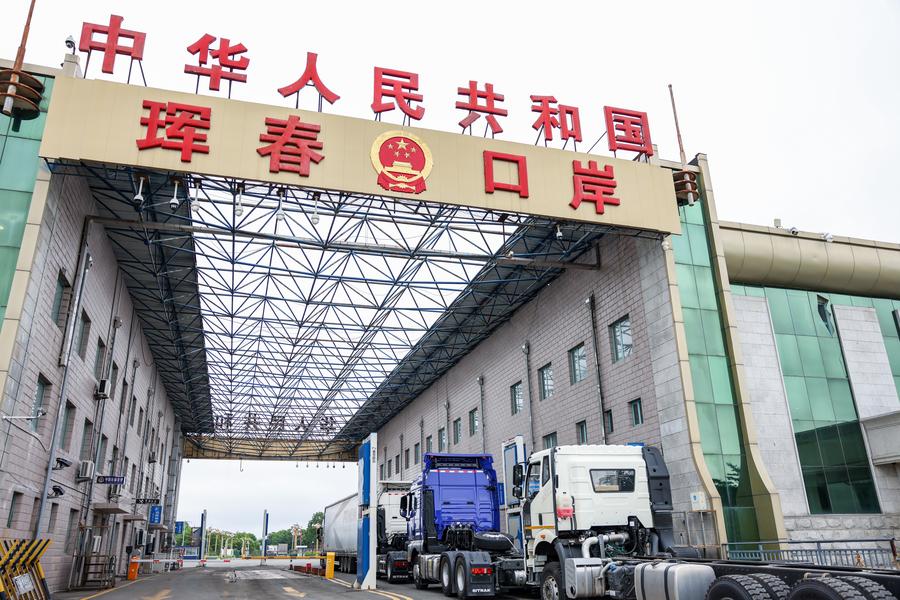Seafood trade flourishes in lively border city

Trucks wait to pass the highway port in Hunchun City, northeast China's Jilin Province, June 26, 2023. (Xinhua/Yan Linyun)
CHANGCHUN, Feb. 6 (Xinhua) -- With Chinese New Year fast approaching, the seafood trade in the northeastern border city of Hunchun is booming, earning it the nickname "capital of king crabs" among netizens -- even though it's landlocked.
Before 2017, the city's seafood traders would route imports through ports in South Korea or Japan. But everything changed in 2017 with the opening of a new sea-land freight route that connected the inland city to Russia's Kamchatka Peninsula and Zarubino Port, drastically reduced the costs associated with importing seafood, making it a more viable and affordable option.
Every day, trucks fully loaded with fresh imports enter the city via a land checkpoint bordering Russia. Seafood shops flank the central business street in downtown Hunchun, northeast China's Jilin Province.
The Russian king crab, also known as the Kamchatka crab, is the star product.
"In addition to in-store purchases, the crabs are ordered via the shop's account on livestreaming platforms. We sell hundreds of crabs a day," said Wang Kaichao, a local seafood shop owner.
He said through railway or aviation logistics networks, wholesalers in Hunchun can promise a same-day delivery of the fresh crabs to buyers in Beijing, which is about 1,500 km away.
Photographs showing tourists holding a colossal king crab or savoring seafood has helped catapult Hunchun to online viral fame.
While promoting its new celebrity status as the "capital of king crabs," Hunchun has vigorously stimulated cross-border e-commerce and the seafood processing industry.
In 2023, the output value of the city's seafood processing industry surged by 20.4 percent year on year to reach 1.4 billion yuan (about 195 million U.S. dollars).
The city has planned to build a fresh seafood industrial park with its business radiation to the Northeast Asian countries. Once completed, it is expected to boast a temporary live-storage capacity of 500 tonnes of fresh products and a cold storage capacity up to 30,000 tonnes of seafood.
Zhu Xiaodan, the person in charge of the Yanbian Hasang Fishery Import & Export Co., Ltd., said the company's business has benefitted from the city's development of the seafood trade. The company needs to optimize its seafood logistic service to cope with the rising demand for the fresh seafood products across the country.
Related articles

Tourism sector sees boom during May Day holiday
The nation's tourism market is expected to see its best post-COVID performance during the ongoin2024-04-30Changes to road user charges will see EV owners paying more, climate expert says
Photo: RNZ2024-04-30Glacier survey paints stark picture as ice and snow disappear
Franz Josef Glacier. Photo: 123RF2024-04-30Call for schools soft drink ban renewed after government implements cellphone ban
Photo: 123RF2024-04-30
China supports full UN membership for Palestine: FM spokesperson
Riyad Mansour (C), permanent observer of Palestine to the United Nations, is seen ahead of the Secur2024-04-30No firm date for reopening of Picton's Dublin Street
Dublin Street in Picton remains closed as KiwiRail and NZTA discuss the future of the Dublin Street2024-04-30





atest comment